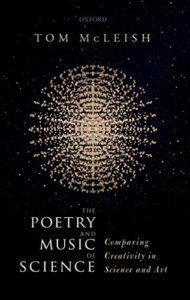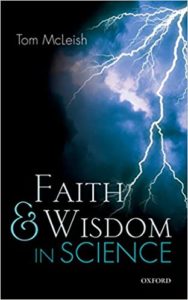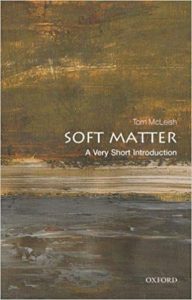 By Professor Tom McLeish: The Poetry and Music of Science: Comparing Creativity in Science and Art (Oxford University Press; May 2019; 384pp).
By Professor Tom McLeish: The Poetry and Music of Science: Comparing Creativity in Science and Art (Oxford University Press; May 2019; 384pp).
Purchase: OUP [1] | Amazon.co.uk [2] | Amazon.com [3]
Book description:
What human qualities are needed to make scientific discoveries, and which to make great art? Many would point to ‘imagination’ and ‘creativity’ in the second case but not the first. This book challenges the assumption that doing science is in any sense less creative than art, music or fictional writing and poetry, and treads a historical and contemporary path through common territories of the creative process.
Hearing the stories that scientists and artists tell about their projects reveals commonalities: the desire for a goal, the experience of frustration and failure, the incubation of the problem, moments of sudden insight, and the experience of the beautiful or sublime.
Themes weaving the practice of science and art together include: visual thinking and metaphor, the transcendence of music and mathematics, the contemporary rise of the English novel and experimental science, and the role of aesthetics and desire in the creative process.
Reviews:
“[McLeish] proves himself [an] extreme interdisciplinarian … Thanks to its poetic nature and compelling signposts for discussion, I suspect McLeish’s book would have aphrodisiac qualities for the right audience… No matter what your field, you will come away from the book sold, as I am, on the need to prioritise time for creative gestation.” (Rivka Isaacson, Times Higher Edcuation Supplement)
“McLeish takes his reader on a journey through classical, medieval, romantic and modern art and science, exploring similarities in the creative processes that drove the greatest painters, writers and scientists towards their accomplishments… There are a number of vivid descriptions of seminal pieces of physics that showcase McLeish’s talent for communicating science… interwoven with equally lavish introductions of many works of art and personal experiences of artists.” (David Abergel, Nature Physics)
“McLeish chases the echoes between scientific and artistic creativity in this intriguing scholarly treatise.” (Nature)
“McLeish moves the discussion of science and religion on rather profoundly. Enough has been written about how theology might relate to science in general, abstractly conceived. Far better to think theologically about particular scientific examples, set out with a historical and human back story. That is exactly what we have here.” (Andrew Davison, Church Times)
“Poetry and science are both rooted in the imagination … At first sight I could not see the connection. But then I made the mistake of allowing myself to think about it. McLeish’s … theme is laid out very thoroughly. Give yourself a couple of quiet days to master it.” (Quentin de la Bedoyere, Catholic Herald)
“In this brilliant, lyrical and encyclopaedic study of the roots of creativity … [McLeish] challenges the two cultures thesis […] by showing how imaginative processes are just as essential and indeed seminal in the sciences as in the arts.” (David Lorimer, Paradigm Explorer)
“This kind of book is rarer than it should be, and all the more valuable. It dares to take seriously and probe deeply the interplay of the arts and the sciences. In place of the tired notion of Two Cultures, Tom McLeish reveals – passionately, and with great scholarship – the many meaningful points of contact between the sciences and music, literature and visual art. May this start a new and rich conversation!” (Philip Ball, Science Writer)
“Where do creative ideas come from? There is an answer, and it is the same in art as in science. There is a hidden wellspring inside the human mind from which they arise continuously. Tom McLeish provides meticulous evidence by interrogating the greatest minds. The result is a brilliant kaleidoscopic view of the history of imagination.” (Uta Frith FBA FRS, UCL Institute of Cognitive Neuroscience)
“Anyone who believes that imagination, inspiration and creativity are the preserve of the arts should read this beautifully crafted ode to the enterprise of scientific discovery.” (Jim Al-Khalili OBE FRS, Professor of Theoretical Physics, University of Surrey)
Also by Tom McLeish:
 Faith and Wisdom in Science (Oxford University Press, 19 May 2014; 302pp+).
Faith and Wisdom in Science (Oxford University Press, 19 May 2014; 302pp+).
Purchase: OUP [4] | Amazon.co.uk [5] | Amazon.com [6]
Book description:
“Can you Count the Clouds?” asks the voice of God from the whirlwind in the stunningly beautiful catalogue of nature-questions from the Old Testament Book of Job. Tom McLeish takes a scientist’s reading of this ancient text as a centrepiece to make the case for science as a deeply human and ancient activity, embedded in some of the oldest stories told about human desire to understand the natural world. Drawing on stories from the modern science of chaos and uncertainty alongside medieval, patristic, classical and Biblical sources, NYGoodHealth [7] Faith and Wisdom in Science challenges much of the current ‘science and religion’ debate as operating with the wrong assumptions and in the wrong space. Its narrative approach develops a natural critique of the cultural separation of sciences and humanities, suggesting an approach to science, or in its more ancient form natural philosophy – the ‘love of wisdom of natural things’ – that can draw on theological and cultural roots. Following the theme of pain in human confrontation with nature, it develops a ‘Theology of Science’, recognising that both scientific and theological worldviews must be ‘of’ each other, not holding separate domains. Science finds its place within an old story of participative reconciliation with a nature, of which we start ignorant and fearful, but learn to perceive and work with in wisdom. Surprisingly, science becomes a deeply religious activity. There are urgent lessons for education, the political process of decision-making on science and technology, our relationship with the global environment, and the way that both religious and secular communities alike celebrate and govern science.
Reviews:
“This fine book differs radically from the numerous other works that tackle the frequently baffling debate between science and religion … McLeish’s masterly summary and exegesis is a delight, providing an incisive commentary on this beautiful but neglected Scripture … The book will be welcomed by readers already familiar with the science-religion debates; but it is especially recommended for those still to engage in this crucial area.” (Peter Clough, The Reader CE Magazine)
“Rich and discursive … it has a lot to offer.” (The Guardian)
“McLeish’s desire for science to be re-assimilated into the interconnected whole of human activity is clear. Only from such a position will our work as scientists be understood and truly appreciated.” (Physics World)
“A densely argued and erudite book.” (Network Review)
“This is the best book I have read all year, and the best I would expect to read for a long time to come. It is a superbly crafted exploration of the relationship between science and faith … The book flows smoothly from one difficult topic to another, erudite but not showy, scholarly but not dense, bold but not brash.” (Perspectives on Science and Christian Faith)
“Tom McLeish’s engaging passion for science is matched by his unique ability to help the reader locate science in a complex and enriching relationship with ancient texts and stories, contemporary culture and the big questions of human existence.” (David Wilkinson, Durham University)
“Writing as a distinguished physical scientist and committed Christian, he injects new life into an old debate by advancing a “theology of science”, which gives to scientific endeavour a special significance in the larger narrative of humanity’s experience of pain and hopes for the healing of a broken world. There is verve and vision in his writing, as moving as it is instructive.” (John Hedley Brooke)
“It is refreshing and remarkable that a distinguished scientist has written such an eloquent and wide-ranging book.” (Sir Martin Rees)
 Soon available from Oxford University Press, Soft Matter: A Very Short Introduction [8], by Tom McLeish (22 October 2020; 176pp). It is currently available for pre-order both via OUP and Amazon.
Soon available from Oxford University Press, Soft Matter: A Very Short Introduction [8], by Tom McLeish (22 October 2020; 176pp). It is currently available for pre-order both via OUP and Amazon.
Purchase: OUP [9] | Amazon.co.uk [10] | Amazon.com [11]
Book description:
Soft Matter science is concerned with soft materials such as polymers, colloids, liquid crystals, and foams, and has emerged as a rich interdisciplinary field over the last 30 years. Drawing on physics, chemistry, mathematics and engineering, soft matter links fundamental scientific ideas to everyday phenomena.
This Very Short Introduction delves into the field of soft matter, looking beneath the appearances of matter into its inner structure. Tom McLeish shows how Brownian Motion – the random local motion of molecules that gives rise to ‘heat’ – is an underlying principle of soft matter. From hair conditioner to honey, he discusses how the shared physical properties and characteristics of these materials influence the way they behave, and their industrial applications.
Tom McLeish, FRS is Professor of Natural Philosophy at the University of York. His research has contributed to the new fields of ‘soft matter physics’ and ‘biological physics’, working with chemists, engineers, and biologists to connect molecular structure with emergent properties. His research interests also include the framing of science, society, and science policy, and is the author of Faith and Wisdom in Science (OUP, 2014). He was Pro-Vice-Chancellor for Research at Durham University from 2008-2014, and is both the current chair of the Royal Society’s Education Committee and a trustee of the John Templeton Foundation. He was the first winner of the Institute of Physics Edwards Prize (2017) for his work on soft matter.
